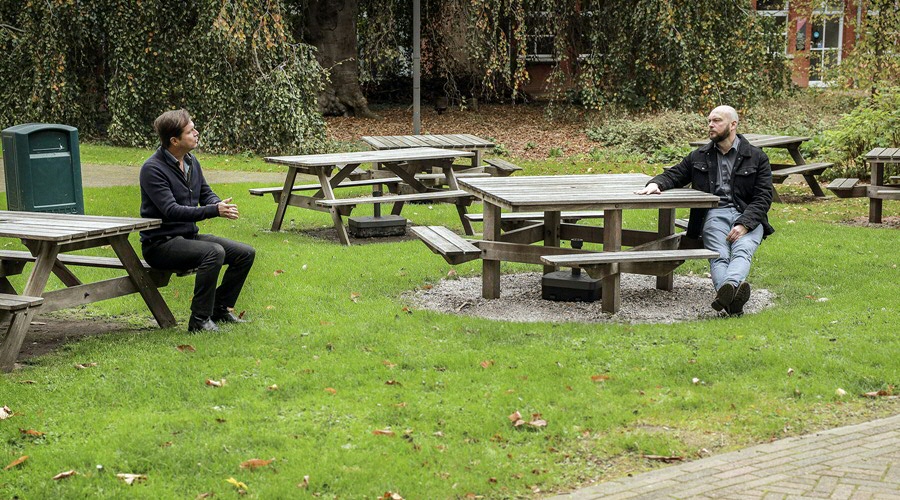Polarisatie: van weerstand naar verbinding
Steeds meer mensen zijn het vertrouwen kwijtgeraakt in de informatie van de regering, academici en beleidsmakers. Ze zien regelgeving niet meer als een oplossing voor hun problemen. Op vrijdag 18 november organiseert de Rijksuniversiteit Groningen (RUG) daarom de Meet & Greet Perspectives on polarization. De RUG wil zo kennis uitwisselen en verschillende visies op polarisatie bij elkaar brengen. De vraag die het evenement aanstuurt: hoe kunnen we de samenleving van de toekomst vormgeven?

Tekst: Layla Zafari / Foto's Mierau en Postmes: Henk Veenstra
De Meet & Greet richt zich op de opkomende generatie wetenschappers in de geestes- en sociale wetenschappen, maar ook op beleidsmakers en vertegenwoordigers van overheidsinstanties. Het evenement is bedoeld om een gesprek op gang te brengen tussen deze groepen, die de komende tien tot twintig jaar de wetenschappelijke en maatschappelijke agenda’s bepalen. Hierbij wordt onder andere besproken hoe burgers beter kunnen worden betrokken en er zo meer maatschappelijk vertrouwen kan worden gecreëerd. Of je nou wetenschapper, beleidsmaker, of geïnteresseerde bent, de Meet & Greet wil je aan het denken zetten over wat je kunt bijdragen aan het verbinden van verschillende groepen binnen de samenleving.
Burger betrekken
In aanloop naar het evenement delen Konstantin Mierau, universitair hoofddocent Europese Cultuur en Literatuur, en Tom Postmes, hoogleraar Sociale Psychologie, hun perspectieven op polarisatie. Hoe kan de wetenschappelijke wereld er bijvoorbeeld mee omgaan? Volgens Mierau mogen universiteiten burgers vaker op de voorgrond plaatsen in onderzoek. Zo creëer je een sterker maatschappelijk vertrouwen en meer herkenbaarheid, vindt hij. Postmes is het hiermee eens. In sociale wetenschappen worden vaak surveys gebruikt, zegt hij, maar het is in veel gevallen zinvoller en leerzamer om inhoudelijke gesprekken te voeren over wat mensen drijft tot een bepaalde actie of manier van denken. Om de burger goed in beeld te krijgen, is interdisciplinair onderzoek nodig. Een complex vraagstuk kan namelijk niet worden beantwoord door een enkele onderzoeksdiscipline.

Complexe vraagstukken en interdisciplinariteit
De huidige maatschappelijke problemen vragen om een breedgedragen aanpak. Waarbij onderzoekers vanuit verschillende achtergronden met elkaar maar ook met maatschappelijke spelers samenwerken. Mierau: ‘Interdisciplinair onderzoek stelt je in staat om expert te zijn op je eigen gebied en de meerwaarde te begrijpen van een ander gebied. Je krijgt oog voor de overlappen tussen de verschillende disciplines.’
Het recht leren door films
Hoe ziet interdisciplinair onderzoek er eigenlijk uit? Mierau geeft het voorbeeld van ‘copaganda’. Het meeste wat mensen weten over wet- en regelgeving komt niet uit het wetboek maar uit films en series die ze hebben gezien of boeken die ze hebben gelezen. ‘Als we iets willen weten over hoe de gemiddelde mens omgaat met recht, dan hebben we een cultuurwetenschapper nodig die weet wat voor films mensen kijken en hoe deze hun doen en denken beïnvloeden. Het wordt dan ineens interessant voor de rechtsgeleerde om met een cultuurgeleerde te praten.’
Context bij de feiten
De geestes- en sociale wetenschappen breien context om harde feiten en interesseren zich voor de innerlijke belevingswereld van mensen. Dit is essentieel bij een onderzoeksthema zoals polarisatie, omdat het een directe impact heeft op het leven van burgers. Het onderzoek van Postmes is hier een goed voorbeeld van. In 2017 interviewden hij en zijn collega’s veertig felle voorstanders en veertig felle tegenstanders van het asielzoekersbeleid. De conclusie was dat alle tachtig geïnterviewden opmerkelijk veel gemeen hadden: ze waren bezorgd over hoe het met Nederland gaat en deelden de mening dat de integratie van asielzoekers veel beter moet.
Raakvlakken voor- en tegenstanders
De tegenstanders hadden in wezen dezelfde zorgen als de voorstanders, maar de manier waarop beide groepen hun zorgen uitten verschilde. Hieruit blijkt hoe sociale wetenschappen raakvlakken tussen groepen kunnen ontdekken, en daardoor wellicht kunnen bijdragen aan het creëren van een minder verdeeld maatschappelijk landschap. Ook Mierau’s onderzoek laat zien hoe verdeelde groepen samengebracht kunnen worden. Zijn onderzoek achterhaalt het effect dat het lezen van boeken heeft op het inlevingsvermogen van gevangenen en hoe dat bijdraagt aan hun resocialisatie. De opgedane inzichten zijn breder toepasbaar op hoe cultuur de samenleving kan verbinden.

Samenklonterende meningen
Toch is het niet altijd even makkelijk om raakvlakken tussen groepen te ontdekken, omdat ze moeilijk te plaatsen kunnen zijn in het maatschappelijke of politieke landschap. Postmes wijst hierbij op de volgende vorm van polarisatie: samenklonterende meningen. Dat betekent dat mensen heel verschillende onderwerpen aan elkaar knopen alsof het om dezelfde dingen gaat: mensen die bijvoorbeeld tegen migratie zijn, zijn ook tegen abortus. Deze ontwikkeling is opvallend in de Verenigde Staten. Hoewel Nederland veel culturele gewoonten overneemt van de VS, klonteren meningen hier iets minder (of op een andere manier) samen. Dat heeft waarschijnlijk te maken met het gevarieerde politieke landschap in ons land. Postmes refereert aan Pim Fortuyn, die destijds sterk anti-islam was maar ook openlijk homoseksueel: ‘Fortuyn was moeilijk te plaatsen in het politieke landschap.’
In gesprek blijven met elkaar
Hoe erg is het als raakvlakken moeilijker te identificeren zijn? Mierau geeft aan dat het niet altijd negatief hoeft te zijn. Polarisatie kan ook productief en constructief zijn, zolang we ons standpunt met respect voor de ander innemen, goed onderbouwen en openstaan voor wat een ander te zeggen heeft. Hij merkt echter dat dit in de praktijk niet altijd gebeurt. ‘Ik denk dat polarisatie tegenwoordig niet alleen gaat om het oneens zijn, maar om het onvermogen om nog gedeeld terrein te zien.’ Postmes sluit zich hierbij aan. ‘Met name op sociale media zie je veel mensen die zich willen uiten maar die geen dialoog meer voeren. Van de vijf mensen die in gesprek willen gaan met elkaar is er altijd één die alleen maar wil zenden en niet wil luisteren.’ In zo’n geval komt er van een constructief gesprek weinig terecht. Mierau pleit ervoor om conversaties te blijven voeren, ook als je het oneens bent met elkaar. Want wanneer je iemands werkelijkheid in zijn geheel ontkent, is er niets meer om over te praten. Dan dreigt het gevaar dat nieuwe inzichten verloren gaan en we steeds verder uit elkaar drijven. ‘Comfort dient een doel maar is geen doel.’

Schrijf je in voor de Meet & Greet
Meer informatie over het evenement vind je op de pagina Perspectives on polarization. Aanmelden kan via het inschrijfformulier.
Meer nieuws
-
17 februari 2026
Van ghostbuster tot rampenonderzoeker
-
14 februari 2026
Tumor weg, maar waar zijn de woorden?
-
03 februari 2026
‘Daar zit een goeie kop op’
